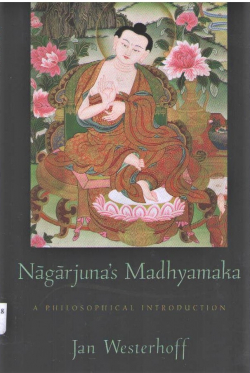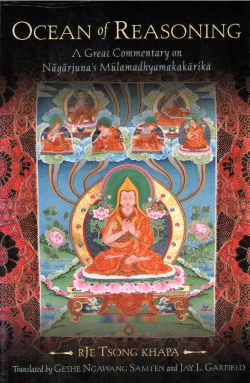Nāgārjuna's Madhyamaka : a philosophical introduction

Type
Book
Authors
ISBN 10
0195375211
ISBN 13
9780195375213
Category
Publication Year
2009
Publisher
Subject
Mādhyamika (Buddhism); Nāgārjuna,--active 2nd century.
Description
xiii, 242 pages : 25 cm; I. Introduction. Nāgārjuna the philosopher -- Nāgārjuna's works -- Methodological considerations -- The philosophical study of Nāgārjuna in the West -- Interpretations of Svabhāva. The ontological dimension -- The cognitive dimension -- The role of negation in Nāgārjuna arguments. Nyāya theory of negation -- Negation and nondenoting terms -- Negation and temporal relations -- The Catuṣkoṭi or Tetralemma. Two kinds of negation -- Rejection of two alternatives -- Rejection of four alternatives -- Affirming four alternatives: the positive Tetralemma -- Causation. Causation: Preliminary remarks -- Interdependence of cause and effect -- The four ways of causal production -- Temporal relations between cause and effect -- Analysis of time -- Motion. Arguments concerning motion -- The beginning of motion -- The interdependence of mover and motion -- The second chapter of the MMK in its argumentative context -- The self. The self and its parts -- The self and its properties -- Epistemology of the self -- The Madhyamaka view of the self -- Epistemology. Means of knowledge as self-established -- Means of knowledge and their objects as mutually established -- Temporal relations between means and objects of knowledge -- The aim of Nāgārjuna arguments -- Language. Nāgārjuna view of language and the "no-thesis" view -- VV 29 in context -- The semantic interpretation -- The specific role of verse -- Conclusion: Nāgārjuna's philosophical project. Metaphysics -- Personal identity -- Ethics -- Epistemology -- Language and truth.; "The Indian philosopher Acharya Nagarjuna (c. 150-250 CE) was the founder of the Madhyamaka (Middle Path) school of Mahayana Buddhism and arguably the most influential Buddhist thinker after Buddha himself. Indeed, in the Tibetan and East Asian traditions, Nagarjuna is often referred to as the 'second Buddha.' ... His primary contribution to Buddhist thought lies is in the further development of the concept of sunyata or 'emptiness.' For Nagarjuna, all phenomena are without any svabhaba, literally 'own-nature' or 'self-nature', and thus without any underlying essence. ... In this book, Jan Westerhoff offers a systematic account of Nagarjuna's philosophical position. He reads Nagarjuna in his own philosophical context, but he does not hesitate to show that the issues of Indian and Tibetan Buddhist philosophy have at least family resemblances to issues in European philosophy"--Publisher's description.;
Biblio Notes
230916730
Number of Copies
1
| Library | Accession No | Call No | Copy No | Edition | Location | Availability |
|---|---|---|---|---|---|---|
| Main | 99008158 | BQ7479.8.N347 W48 | 1 | Yes |


